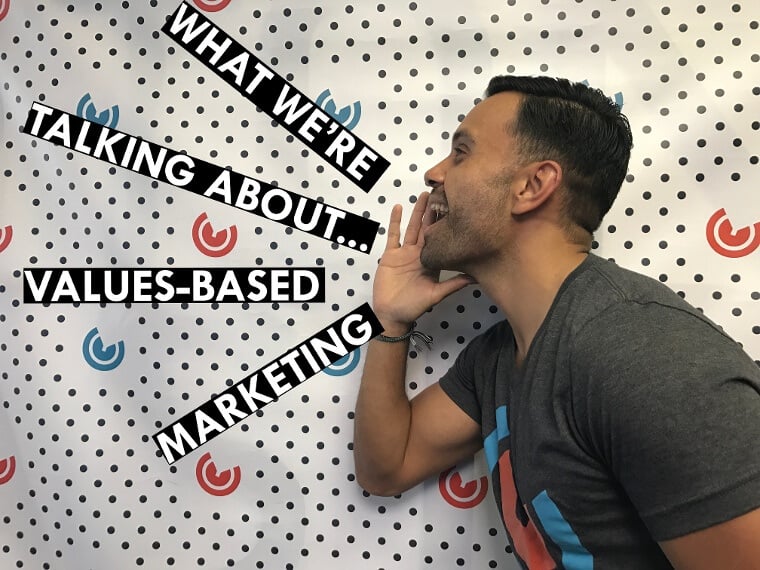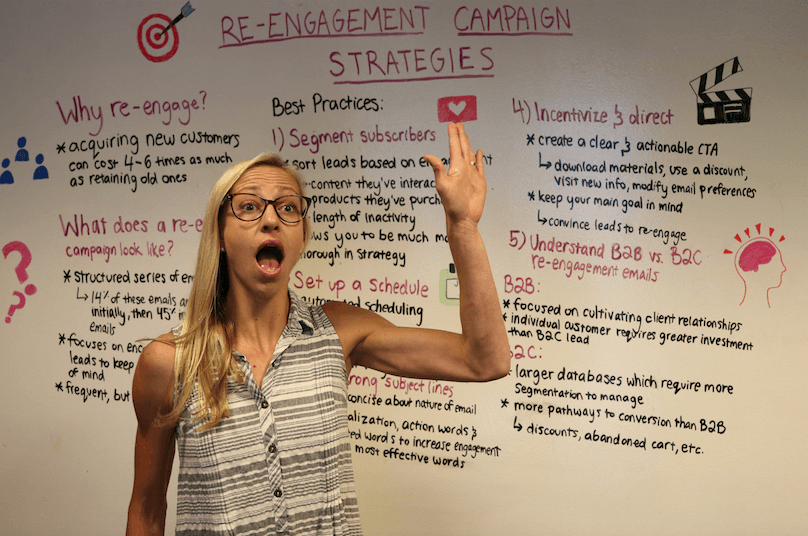Why Marketing Technologists Hold the Secret to Conversion
Netflix, Amazon, Spotify—what do all of these things have in common? All of these platforms represent the ways that technology is using big data to...
I know what I am looking for, and would like to chat.
A team of data-driven marketers obsessed with generating revenue for our clients.
Because the proof is in the pudding.
At Campaign Creators we live by three principles: Autonomy, Mastery, Purpose.

Values-Based Marketing is an appeal to a customer's values and ethics. It shifts marketing from a product-centric approach to a customer-centric one (Chron). It is important for companies to realize that the modern buyer cares about a brand's values as much as, if not more than, its products. We can see on the other-hand, if companies don't, they'll end up suffering loss of ROI and customers, as can be seen from companies like Pepsi, with their failed “Live for Now” campaign, and United Airlines, when staff aggressively pulled a passenger off a flight.
In fact, consumers now name “authenticity”, or being true to a brand's values, as the most important factor in the purchase of something from a brand. This can often align with the effect of a positive customer experience, which benefits different points of the sales process, including lead generation and lead nurturing. Nowadays, philanthropy and cause marketing isn't just good for the world, it's good business.
If you want to know about value-based marketing and how it can help your company, here's what we're talking about....
Why should you use values-based marketing? Is it actually an effective strategy?
These are questions MarketingDive seeks to solve with their article, using the example of Under Armour's “I Will What I Want” campaign and the research conducted by Zenzi, a values-based marketing agency, to help identify six different core value categories of customers.
How Under Armour applies values-based marketing strategies to their campaign is through a lead nurturing process, by essentially creating a culture around their product, appealing to the emotions of their target audience.
The case study presented in this article was one of Under Armour's 2015 marketing campaigns, which presented a video of the supermodel, Gisele Bündchen, practicing kickboxing while text appeared on the walls around her, written by fans and anonymous social media users, targeting her for engaging in an activity that is outside her norm. What this campaign sought to achieve, was to reinforce the idea that, if you put your mind, body and effort into something, you can achieve what you strive for. This campaign ultimately garnered 1.5 billion impressions and led to 28% sales increase for Under Armour. But, why? Because - consumers “look for meaningful relationships with brands,” and Under Armour presented just that.
That leads us into the six core value categories, identified by Zenzi, which if you're going to explore values-based marketing, you should incorporate whichever best reflects your brand and customers. The six core value categories include:
However, take note, just as Under Armour did with their 2015 campaign, that the values you promote to your audience can change, depending on the channel you reach out over. For them, their copy changed from achievement-oriented as the face of their company, to tradition-oriented over social media. This is a great example of understanding one's customer experience in a multifaceted way, which you should explore, too, to better nurture leads when using values-based marketing.
Dove cracked the code in 2004 when it came to marketing using values surrounding their mission statement, to campaign towards a larger audience of women rather than those in the targeted niche of being unrealistically beautiful. Their campaign focused around the ideation that beauty can be found within, coming from oneself, which positioned themselves as more than just a business, but as a group that cares about the good of society.
Furthermore, what this case study achieved for Dove, was that customers felt a sense of acceptance from the company, which ultimately attracted a larger customer-base than what they held previously.
In 2016, Dove still follows this marketing strategy, of including people who've overcome real obstacles, to achieve their goals. Ultimately, Dove has seen success, using values-based marketing with its newest campaign, and achieving 13 million views on YouTube. From their own report, too, they found 54% of women claim to have low body confidence. So, it's no wonder, when they appealed to their customer-base's values, ethics and experience, that they saw more success.
By having a clear idea of what it means to use a Dove product, they as a company are again creating a culture with their audience, and in this way, they are also nurturing their leads to become customers by building a strong relationship.
This next article comes from us and is about the brand, TOMS, and their success when employing two separate values-based marketing strategies.
The first campaign they had, was a “one-for-one” business model, in which they'd donate one pair of shoes for one bought. This initially appealed to a lot of individuals, introducing many new customers to the company because of its selfless image.
Their second campaign went by the name of “One Day Without Shoes,” encouraging their Instagram followers to post tagged photos of their bare feet, and in-turn then donated a pair of shoes for each photo posted. This campaign reached out directly through a customer experience-centered social channel, receiving just as great positive exposure as their previous campaign.
TOMS has demonstrated the success of values-based marketing. Of course, they found the perfect channel to navigate, and strategy to incorporate when it came to their brand, and so should you, to begin best generating and nurturing leads into paying customers.
How do I create an effective values-based, or cause, marketing campaign? Well, we've got the answer for you, taken from this article by Harvard Business Review, which details five elements of an effective values-based marketing campaign, by analyzing previously successful cause campaigns, gathering input from a target audience, and using scientific research for validation.
The five elements of an effective values-based marketing campaign originated, when a comparison of top values-based marketing campaigns revealed that campaigns tended to spread sporadically across a grid of “rational” to “emotional” and “whimsical” to “threatening,” meaning there was no one way to conduct an effective values-based campaign. Rather, these elements, or commonalities, were gathered through analysis of the many successful values-based marketing campaigns, which include:
Furthermore, following a survey of 1,000 consumers, which asked what values-based marketing campaigns they remembered best, a consistent 69%of people responded by saying straight-forwardness was best.
What do we gain from knowing all this? Well, we can assume that campaigns oriented towards customer experience will attain larger success in the long-run, which, of course, includes values-based marketing campaigns. So, whether you're demonstrating this through how you're blogging, marketing over social media, or in-person, you'll want to understand the woes and worries of your target audience, and only then, will you then be able to optimize how you nurture leads.
Remember United Airlines PR incident back in 2017? Lion Project remembers (and so do we). A paid customer was dragged off one of United Airline's planes, in order to make room for flight attendant staff. Naturally, this propelled their stocks to tank for a bit, following, and many people started considering Southwest Airlines over United.
By this, Lion Project's article takes a look at the other side of values-based marketing, how branding matters and the “powerful driver [of corporate social responsibility] in today's marketplace.”
What is corporate social responsibility though? Also known as corporate philanthropy, socially conscious branding, and corporate citizenship, it is when a brand or business effectively aligns themselves with consumers or professionals, offering more than just product or service.
United Airlines failed to do this.
Furthermore, as can be seen in Lion Project's “Is Cause Marketing Important to Your Business?” infographic, statistics suggest that values-based, or cause, marketing can play a strong role in lead generation and converting leads into customers. Here's some of their findings:
How do these statistics suggest an inclination of lead generation and lead conversion? Well, they indicate the importance of customer experience. So, if you can better market your brand to support causes they care about or align with values they hold dear, there would be a higher likelihood of successfully gaining their business. Begin nurturing and converting leads into valued customers, using values-based marketing strategies, to see greater return on investment and to grow greater relationships with your customers.
See a trend with all of these articles, that they're case-study-oriented? That's because we want you to see the direct impact companies can have by relaying genuine, value-inspired messages to their target audiences. There's really no other way, either, to show how responsive consumers can be to values-based marketing and positive customer experience.
Now, what do those two together do for your business? They reinforce and positively effect your lead nurturing strategies. So, if this is a strategy that you believe would work well as one of your business's marketing strategies, employ it! If not, no worries, but know, we offer a Lead Nurturing Masterclass, where you can learn much more about different nurturing strategies, including B2B and email-focused strategies.

Netflix, Amazon, Spotify—what do all of these things have in common? All of these platforms represent the ways that technology is using big data to...

A content pillar is a broad piece of website content that's comprised of and connected to a series of owned media topic clusters that cover a...

Re-engagement is a technique used by marketers to reach out to leads who were at some point interested in and engaged with their company, but have...